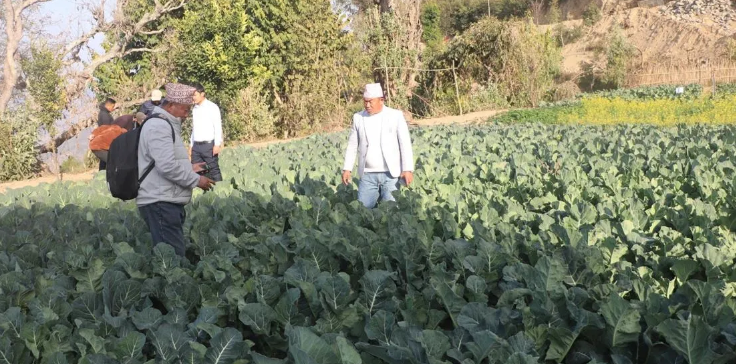#OrganicFarming #SustainableAgriculture #ClimateResilience #EnvironmentalConservation #AgriculturalDevelopment #Nepal #FarmerEmpowerment #Eco-friendlyPractices
In Bhojpur, the Ram Prasad Rural Municipality has taken significant strides in expanding organic farming, notably in Wards 1, 3, 4, and 6, where organic agriculture is now widespread. The establishment of five agricultural training centers has empowered farmers with essential knowledge, promoting organic production methods. According to technical expert Moti Limbu from Spread and ISIMO, these centers serve as hubs for showcasing sample vegetable farming techniques.
Emphasizing climate-resilient practices, the program encourages organic and health-conscious agricultural production. Farmers receive training in greenhouse construction and polybag production, fostering practical learning in eco-friendly farming techniques. Ganesh Shrestha, a local resident, highlights the positive impact of the program, with 15 hectares now dedicated to organic vegetable farming in the area.
The local government, allocating a budget of NPR 15 million for climate change initiatives, supports various environmental conservation efforts, including agricultural development, watershed management, and eco-tourism. Mr. Ananta Rai, Chief of the Administrative Section, reveals plans to extend ongoing projects to other wards, ensuring sustained progress.
With plans to expand the current five training centers to eight, implement 15 more compost pit improvement programs, and construct 16 additional ponds for water conservation, the municipality aims to further integrate organic and commercial farming practices. Mr. Thambahadur Rai, Chairman of Ward 6, highlights the importance of utilizing fallow land for organic and commercial farming initiatives.
In line with this vision, the municipality is actively promoting the use of compost manure from cow and buffalo dung, alongside chemical-free farming practices, fostering a holistic approach to sustainable agriculture. The implementation of mixed cropping, greenhouse farming, and the preservation of indigenous seeds underscore the commitment to environmentally conscious farming.
The shift away from chemical fertilizers has not only preserved soil fertility but also safeguarded consumer health. As organic agriculture gains momentum, farmers are increasingly engaged in sustainable and profitable farming practices. Ward 6 Chairman, Mr. Ekraj Acharya, emphasizes the need for collective support in transitioning to organic and commercial farming, echoing the sentiment that the region is now witnessing a surge in entrepreneurial organic farming endeavors.










